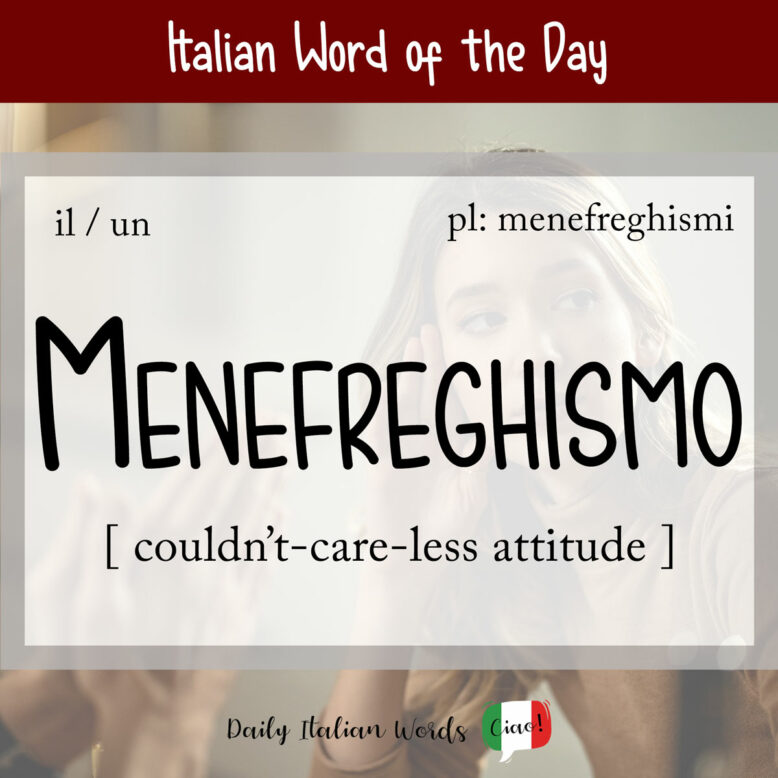If you happen to meet someone who simply doesn’t care about other people’s problems or the issues facing the world, they may be suffering from what is called menefreghismo in Italian (masculine, plural: menefreghismi).
Sadly, there isn’t really a word-for-word translation for menefreghismo in English, which is a shame because we could definitely benefit from a word like this!

It is the combination of the expression me ne frego and the suffix -ismo (-ism). Literally, it translates as something close to “I-don’t-give-a-damnism”. Most dictionaries provide the translations indifference, callousness and couldn’t-care-less-attitude.
Non è un ragazzo cattivo, ma il suo menefreghismo lo rende antipatico a tutti.
He’s not a bad guy, but his couldn’t-care-less-attitude makes him appear unpleasant to everybody.
The word menefreghista describes a person who doesn’t care about other people or what’s happening around him or her (or in other words, it refers to a person who suffers from menefreghismo). You can also use it as an adjective. Here as well, there isn’t a direct translation in English.
In ufficio fa sempre il menefreghista. Prima o poi lo licenzieranno.
He always has an uncaring attitude at the office. Sooner or later they’ll fire him.

What does ‘Me ne frego’ mean in Italian
Me ne frego means I don’t care or I don’t give a damn. It contains the verb fregare, which translates in many ways: to rub/scrub, to steal, to cheat or to care less. From fregare we also get the colloquial form fregarsene, which is an intransitive pronominal verb and the version you see in this expression. Here is how you conjugate it:
(io) me ne frego
(tu) te ne freghi
(lui/lei) se ne frega
(noi) ce ne freghiamo
(voi) ve ne fregate
(loro) se ne fregano
During the First World War, which was the time at which fascism originated, the phrase me ne frego was sung by the arditi, a volunteer special force, to show their disregard for their lives on the front lines.
Me ne frego was also the title of one of the most famous songs of the Fascist era, in which the old war song of the arditi appears in the third stanza.
Me ne frego
I don’t care
me ne frego
I don’t care
me ne frego è il nostro motto
I don’t care is our motto
me ne frego di morire
I don’t care if I should die
per la santa libertà!
For our sacred freedom!
Heather Broster is a graduate with honours in linguistics from the University of Western Ontario. She is an aspiring polyglot, proficient in English and Italian, as well as Japanese, Welsh, and French to varying degrees of fluency. Originally from Toronto, Heather has resided in various countries, notably Italy for a period of six years. Her primary focus lies in the fields of language acquisition, education, and bilingual instruction.


